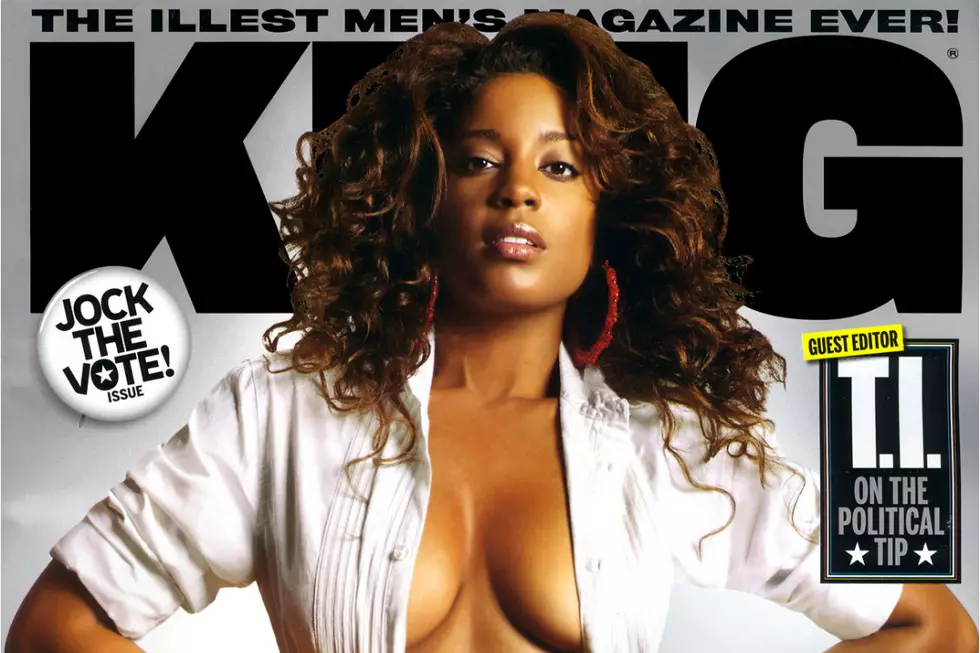You’ll Never Eat In This Town Again
 Wiping that smile off Wesley Snipes' face shouldn't be such a difficult task. There's plenty of ammunition to choose from. The crass approach is a good start: Tell one of the '90s' most iconic box-office movie stars that he's washed up. Or maybe be blunt and tell him that his triple-threat juice has gone sour because he refused to play nice with Hollywood brass. If none of these pokes grinds his gears, we can pull out the trump card: Tell him he's an asshole
Wiping that smile off Wesley Snipes' face shouldn't be such a difficult task. There's plenty of ammunition to choose from. The crass approach is a good start: Tell one of the '90s' most iconic box-office movie stars that he's washed up. Or maybe be blunt and tell him that his triple-threat juice has gone sour because he refused to play nice with Hollywood brass. If none of these pokes grinds his gears, we can pull out the trump card: Tell him he's an asshole
Sitting in a red velvet booth in New York's cave-dark W Hotel Underbar on a humid July evening, Snipes is still laughing. Our jabs have been as successful as Glass Joe's boxing record. "It's kind ironic because I shouldn't be here,†muses Snipes. "I don't vex on it. If the gentlemen who told me I would never work in the business were successful, then why are they writing about me? What's the story?â€
The story is this: Wesley Snipes is fighting to save his career. Insiders point to his very public battle with New Line Cinema as the breaking point to his expulsion from Tinseltown. There were news leaks that while on the set of 2004's Blade: Trinity the difficult centerpiece of the Marvel Comic vampire-hunting franchise was clashing with co-stars as well as writer-director David Goyer. There were also rumors that Snipes made physical threats to Goyer over creative control. Snipes' protest on the set reportedly grew so brazen that he refused to appear in various fight scenes, prompting Goyer to hire a body double to which he would later add ac computer-generated copy of the disgruntled star's face.
Snipes then committed what in the movie biz amounts to career suicide: He launched an August 2005 lawsuit against New Line, claiming the company failed to pay the final $3 million of his $13 million salary and conspired him to box him out of the lucrative film series. The lawsuit is still in litigation.
This past July, United Talent Agency, which unceremoniously dropped the actor from its roster, sued Snipes for more than $2 million in unpaid commissions. These actions follow a May 2003 headlines when Snipes' $1.7 million, 7,375-square-foot mansion in Isleworth, Florida, was sold on the auction block after he failed to make mortgage payments. His upcoming film, Hard Luck, set for an October debut, is coming to a Blockbuster near you, continuing Snipes' streak of straight-to-DVD releases. And Snipes is now without a major studio home. So again, why is this man smiling?â€
Wesley Snipes in Blade (1998)
"What can they do to hurt me?†asks a defiant Snipes. A spiritual man – he claims to study what he refers to as an "ancient African sciences†– Snipes anchors his sentences with phrases like, "by the grace of the most high.†At 44, the Bronx native has hardly aged; his enviably toned face still resembles the young thespian who brought menacing Harlem drug lord Nino Brown to life in New Jack City 15 years ago. Snipes claims he has come to terms with his unofficial banishment from the let's-do-lunch fraternity. "But at the same time you are clearly the hot ho on the block,†he says. "You're a blonde walking through the ‘hood. And so if they can't get it the way they want, [they] will use you and your heat.â€
The actor-producer reasons that his battles with Hollywood powerbrokers come down to a lack of respect for a draw that anchored the six-year-old Blade trilogy, which grossed nearly $400 million worldwide at the box office and $250 million in domestic DVD sales. He says that Trinity executives were pushing him out the door before filming even started, when they brought in two younger, white characters played by Jessica Biel and Ryan Reynolds to marginalize his lead. "I don't have anything against New Line,†Snipes says. "but I realized some of the other people behind the scenes didn't have the same concern. What they wanted was, ‘Nigga, come to the set.'â€
Wesley Snipes as "Nino Brown" in New Jack City (1991)
As for his dealing with David Goyer, Snipes says, "I got credit for threatening people I've never threatened. For Mr. Goyer [Trinity] is the only [big-time] film he ever directed.†Goyer, who is currently co-writer and executive producer of the Blade television series on Spike TV, would only say to KING: "We knew we had to go in a different direction.â€
Snipes is unimpressed. "I heard the ratings have been good,†he says. "I see every time they promote it they put [my] name on it. They don't leave that motherfucker out. They still pimping that blonde in the hood, huh?â€
While traveling a congested Thailand highway one day in the mid-'90s, Wesley Snipes had an epiphany. Rocky and Rambo icon Sylvester Stallone, who was overseas for the opening of a Planet Hollywood, invited his former costar to visit. Sly told him about how on an earlier visit, for the shooting
Of course, critics can say that Snipes' moment of clarity actually opened the door to a number of questionable film roles. His foray into popcorn vehicles has been uneven at best. From U.S. Marshals (1998) and The Art of War (2000) to DVD releases The Marksman (2004) and 7 Seconds (2005), the theater-trained actor has become a one-dimensional action junkie. Harry Knowles, a film critic and founder of influential fan-boy site Ain't It Cool News, believes Snipes has squandered his exceptional acting gifts. "I would really like Wesley to go and do some independent work that shows his great range as an actor—and that he [will] allow himself to be reinvented,†he says. "He's still an abundantly talented guy.â€
"At some point he started caring more about the money and less about the roles,†says Snipes' former manager Delores Robinson, who sued him for back wages and was later countersued by the star. "Wesley had been offered a few roles to films that I thought he should have taken, like [the Academy Award-nominated] The Hurricane?. He felt like the studio wasn't giving him the money that he deserved. But I'm still his biggest cheerleader. I've never found anyone as exciting as Wesley Snipes since.â€
 Indeed, despite all the drama, Snipes' peers, former colleagues and foes all still offer glowing endorsements. And Snipes, for his part, still posesses the mojo. When he discusses a mixed bag of subjects ranging from the state of the Middle East ("These wars ain't helping…â€) to his surprising workout regimen ("I do much more Pilates, not weight lifting…â€) he's as personable as ever, exuding a natural movie-star quality that is downright charming. It reminds you that Wesley Snipes wasn't just a good actor, he was the ultimate triple threat. Will Smith may have had more box-office punch, but could the Fresh Prince give a stripped-down, heart-wrenching performance as a one-time ladies'-man-turned-paraplegic in The Waterdance (1992)? Denzel Washington may have struck a more regal chord, but could the Academy Award-winner pull off Snipes' comic timing as a basketball hustler in White Men Can't Jump (1994)? Even the eclectic Johhny Depp may have transformed himself into a believable action star, but could the Pirate of the Caribbean choreograph intricate fight scenes as a 3rd-degree black belt in Tae Kwan Do?
Indeed, despite all the drama, Snipes' peers, former colleagues and foes all still offer glowing endorsements. And Snipes, for his part, still posesses the mojo. When he discusses a mixed bag of subjects ranging from the state of the Middle East ("These wars ain't helping…â€) to his surprising workout regimen ("I do much more Pilates, not weight lifting…â€) he's as personable as ever, exuding a natural movie-star quality that is downright charming. It reminds you that Wesley Snipes wasn't just a good actor, he was the ultimate triple threat. Will Smith may have had more box-office punch, but could the Fresh Prince give a stripped-down, heart-wrenching performance as a one-time ladies'-man-turned-paraplegic in The Waterdance (1992)? Denzel Washington may have struck a more regal chord, but could the Academy Award-winner pull off Snipes' comic timing as a basketball hustler in White Men Can't Jump (1994)? Even the eclectic Johhny Depp may have transformed himself into a believable action star, but could the Pirate of the Caribbean choreograph intricate fight scenes as a 3rd-degree black belt in Tae Kwan Do?
And yet, a series of films that never even made it to the big screen finds the once critically acclaimed actor keeping closer company with dubious hacks like Jean-Claude Van Damme and Steven Seagal. Snipes says there are other forces at work, though. "You know as an artist you never want to be criticized,†he says in a rare vulnerable moment. "But on the other hand, you wish you could explain how the machine works so people would have a more comprehensive understanding to better qualify their opinions. I never went into doing films overseas thinking they were never going to be distributed, but the agents knew. They are just telling you that you are going to get your $10 million dollars. It's prime rib, and you are grinded down to a hot dog.â€
Yet Snipes doesn't concern himself with his place within the pantheon of elite actors. Not after working his way up the film world's food chain, from a struggling actor installing telephones in New York City to a leading man, even after casting agents told him he was too dark to ever have such top-dog status. Snipes proved them wrong by becoming not only legitimate, but a sex symbol as well. But first he had a meeting with the most famous man in the world.
It was late 1986, and the kid from the Boogie Down Bronx was on the streets of Harlem, on Adam Clayton Powell Boulevard with arguably the biggest star on the planet: Michael Jackson. The setting was preposterous, really. Wesley Snipes was a theatrical creature; he had honed his craft performing Shakespeare at New York's prestigious High School of the Performing Arts and later the State University of New York at Purchase. But here he was, the actor, playing a hoodlum in a long-form music video for Jackson's new single "Bad.†Adding to the mix was legendary film director Martin Scorsese and a rowdy throng of fans and onlookers. Michael Jackson? Scorsese? Harlem, USA? The shoot was as exciting as it was surreal. It was then that Snipes got his first taste of the cult of celebrity—a somewhat bitter taste, at that.
"People were yelling and screaming on one side of the street like, ‘Yo, Michael, we love you!'†Snipes remembers. "And then mixed among them are the ones saying, ‘Michael Jackson, you ain't shit! You don't love black people, Michael!' So Mike asked, ‘Are you scared?' Shockingly. And I'm like, ‘Naw. Why Mike, you scared?' He's like, ‘A little.'â€
Was this the price of success, wondered Snipes? He didn't want to lose his connection to the 'hood. That could never happen; not when he was still living on 181st Street in the Bronx. He took that New York City swagger to Orlando in the summer of '77, when his mother, a teacher's aide, grew concerned about her teenage son growing up in the Bronx. The single-parent family of two girls and a boy had to deal with what amounted to culture shock, as Snipes transferred to Jones High School in O-Town.
Two young, passionate drama teachers, Karen Rugerio and Sue Purro, quickly took notice of their new student. Rugerio, a Philadelphia native, had aspirations of building a respectable theater program at the Orlando school. Snipes had already carved out a reputation for himself, as part of the Struttin' Street Stuff acting troupe, so for the next two years the women took an interest in the gifted and admittedly headstrong talent. "Wesley was about 5-foot-6 and he must have weighed 100 pounds soaking wet,†says Rugerio with a laugh. "He was heads above anything else you could imagine [at that age]. He was just so intense, but at the same time, Mr. Personality.â€
Snipes excelled, showcasing his versatility in plays like A Raisin In the Sun and West Side Story. By the winter of 1980, he had made a bold move. He knew he couldn't stay in Orlando to pursue his craft. For many blacks, making it in that pre-Universal Studios southern city meant working in the orange groves. He promptly headed back home to audition for State University of New York at Purchase's theatre program. "This kid got on a Greyhound with no money, and a month later he had his Pell Grant and the whole package,†says Purro of her star student.
"They can say, ‘I helped water that flower,' †says Snipes of the incalculable impact the two teachers had on him. Ten years later, the Bronx kid sat in a Beverly Hills office with another woman who would have a major affect on his life. Delores Robinson had heard about the up-and-coming actor who went toe-to-toe with Oscar winner Denzel Washington in Spike Lee's Mo' Better Blues.
"My antenna was going through the roof,†Robinson recalls. "We went out to dinner that night and we talked about his career and what he wanted in his life.â€
Robinson took on the young actor, promptly setting him up with the makers of an upcoming project called New Jack City. The 1990 pitch by late film producer George Jackson was grandiose: An urban version of The Godfather, with the most talented black actors recruited for the ensemble cast. "I was thinking about Laurence Fishburne being in it, like, ‘Oh, this is going to be hot!' But they hooked me in,†Snipes says. "I saw Ice-T and Nickolas Ashford . . . I was like, ‘What movie is this?'â€
Snipes would later warm up to Ice-T and proceed to lay down a performance that signaled his arrival as a new star. "I just remember one of the scenes when we were on the roof and Nino Brown told me he killed my character's mother,†says Ice T. "When that nigga told you he killed your mother, you believed it! I mean, when he got shot at the end of the movie, the audience was upset.â€
New Jack was the film that opened up the door for Robinson to get her client a $5 million payday, back then a rarity for a black actor. By the mid '90s, he would double his fee, all the while keeping his street cred. Snipes was a Hollywood heavyweight. But it wouldn't last for long.
It's clear Snipes is more than leery of the press. During the lean years, he has made himself largely unavailable to journalists. He doesn't even blink when he pulls out his own tape recorder during our interview, saying matter-of-factly that he merely likes to make sure all the facts are straight. Early on, his name was splashed in the tabloids. There was the 1993 firearm charge in California, to which he pleaded no-contest. A year later he was charged with driving recklessly in Florida. But that was hardly the Mel Gibson variety of career-ending scandal. There were the absurd stories that the press was all too happy to jump on. Like the one that had Snipes purchasing property in Eatonton, Georgia, to train an armed black militia, joining up with the religious cult the United Nuwaubian Nation of Moors. In reality, the business-minded Snipes said he was only trying to create a training camp for celebrities' bodyguards. (His permit request was subsequently turned down by the city.)
But perhaps the most blatant media assault was the 2004 headline involving Snipes and Lanise Pettis. Pettis, a crack addict, claimed Snipes was her cousin and that they had conceived a child together; in other interviews, she claimed she and Snipes secretly married and government agents in black helicopters had warned that they never mention the nuptials. After Snipes failed to show up for a hearing, a bench warrant was issued in New York for his arrest. It was obvious that such a wacky scenario would never have included a name like Leonardo DiCaprio. The case was later thrown out, so why didn't Snipes just show up in court to expose the scam? He is incredulous.
"You can't just say, ‘Wesley Snipes is my baby's daddy,'†he scoffs. "You have to have some corroborating evidence. The object was never to prove if it was my child or not. The object was to find out, what does he have? Where are the assets? How can we control him? What can we get? Those are the real issues.â€
The "we,†Snipes contends, are a few people that don't want to see him eat lunch in Hollywood ever again. In a March 2005 New Yorker article, William Morris Agency president Dave Wirtschafter said of his former client, "[Snipes] believed he was a $15-million-dollar movie star. The market doesn't reflect that.â€
Snipes has no doubt felt the repercussions of taking on the movie industry. But he has maintained an engaging sense of humor. The quote monster that once told a writer in 1998 that Asian women were "bedroom generals,†can laugh at his controversial past. ("The sisters were mad at me, but we are cool now,†he says.) Snipes credits his family as a support system with helping him keep a levelheaded perspective about it all. Of his wife, Korean artist Nakyung "Nikki†Park, and his four kids he says: "[My children] speak Korean, Spanish and Chinese. And [Nikki] is a fantastic woman . . . . I'm a victim of love.â€
There is still, however, the matter of his career. Snipes, who splits his time between residences in New Jersey and New York and on location overseas, claims he has seen the future. He talks of using the movie-distribution mechanism in places like London and Bucharest—areas that Hollywood begun to stake out as fertile ground. And now, there are folks who say Snipes may have the last laugh. "It's been said many times,†says Robinson, "but Wesley is only one hit away.â€
However, before you can tell him the kind words, he is gone. "Mr. Snipes says he will take care of the bill,†says a leggy waitress. Somewhere, you can envision a confident Wesley Snipes doing what comes naturally. Wearing that smile.
More From King







